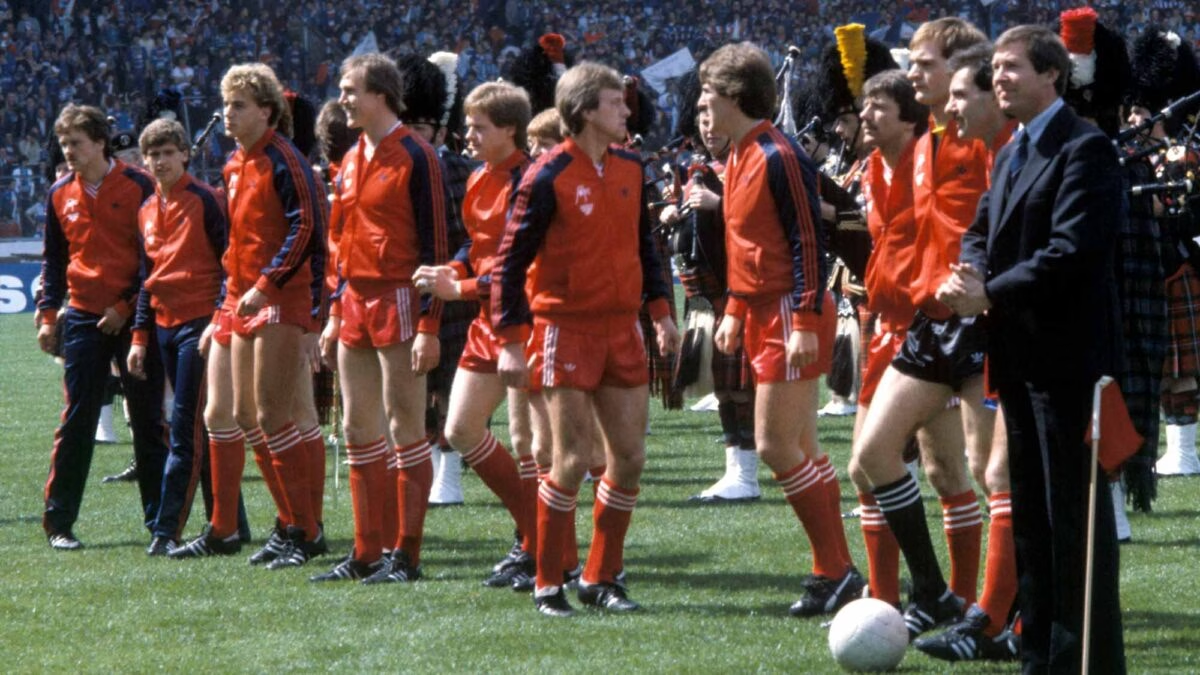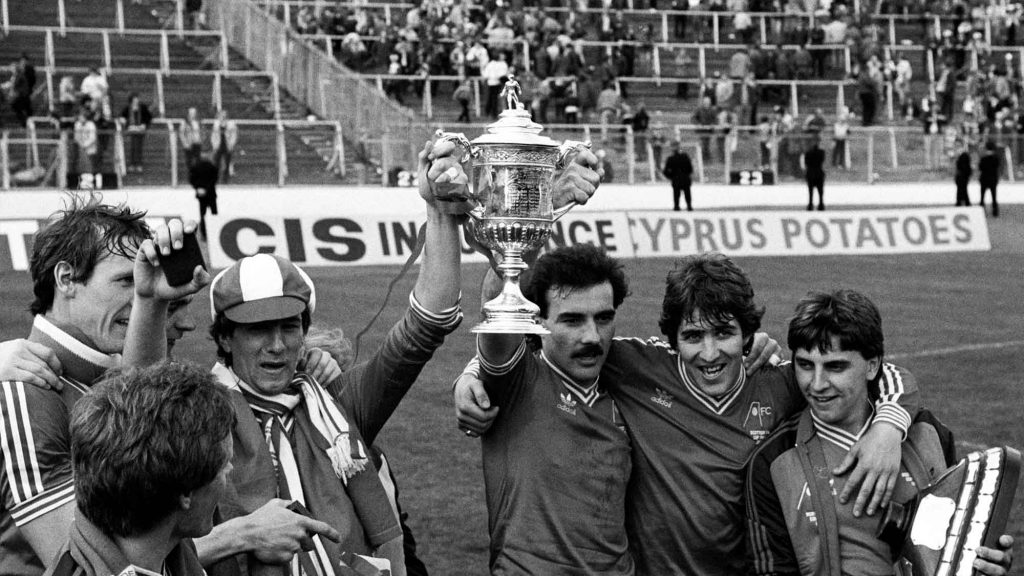News

The School of '82
After Eddie Turnbull’s side lifted the trophy at Hampden in 1970, the rest of the decade offered only barren years as far as a cup run was concerned, while the early 1980s offered little relief either.
There had been some really painful defeats in the semi-final and final stages in the League and Scottish Cups.
As the history books show, Alex Ferguson was building a special side in the Granite City, one that had already delivered the Premier League title and a tilt at the European Cup. But still a win in the season’s glamorous finale eluded even Fergie as the 1982 competition got underway in January with a trip to Motherwell. Would this be the year to lay the Scottish Cup hoodoo to rest?
Certainly the Dons had proved themselves to be right at the top of the domestic game, a side that need fear nobody in league or cup competition.
But was there any sense that this might just be Aberdeen’s year? Not according to striker Mark McGhee.
“When you set off on a cup run, I don’t think you ever really look ahead to what you’re going to do in the competition, whether you’ll end up at Hampden Park or not. You just look at the game coming up, hope to come through it and then look for a home draw in the next round. I don’t think you can ever do any more planning than that. Looking back at that season, we had a tricky draw away first off at Motherwell but then we got a couple of ties at Pittodrie and that was always a big boost because we felt we could beat anybody at home.”
The Lanarkshire side were going really well in Division One when they met the Dons in the Scottish Cup that season. Although the game is remembered for John Hewitt’s winning strike after nine seconds, it is forgotten just hard Aberdeen were pushed that afternoon. How AFC history would have been different had they not won!
The cup disappointment allowed ‘Well to concentrate on the league. The season was a triumph for manager Davie Hay as he saw his side romp away with the title, scoring 92 goals to create a First Division record.
Aberdeen would go on to greater things.

After Motherwell were overcome by that solitary goal, it paved the way for a visit from Celtic. With the Bhoys striding clear in the league and Aberdeen seemingly all but out of the championship race, it was a must win game if the season was not to come to a anti-climactic end with three months still to go.
A John Hewitt goal was enough to see the Dons through to the fifth round, a massive victory that had self belief coursing through the club once again. After that, there was no way that Kilmarnock could come to Pittodrie and cause an upset, Aberdeen progressing serenely into the last four and an appointment with St Mirren. The Paisley outfit, who had foolishly dispensed with Ferguson’s services but were still a major force in the early 80s, put up a spirited display, drawing 1-1 at Celtic Park in the first game before succumbing 3-2 in a dramatic replay at a mud bath at Dens as Aberdeen prepared to make history.
But standing between the Dons and a desperately needed Cup win were the other half of the Old Firm, Rangers, a club needing to win to match Celtic’s success in the Premier League title race.
For Aberdeen however, it was a day to be relished, with nothing more to worry about than winning, as McGhee recalls. “When we got to Hampden, it was twelve years since Aberdeen had won the Scottish Cup and that was something we wanted to put right. For many of us, it was the first Scottish Cup Final we’d played so there was a lot of excitement about it in that sense, and that was all it was to us, a great occasion.
“We were still a very young team, we’d people like Neale Cooper, Neil Simpson, John Hewitt, guys like that, and it was a big contrast because we were up against a Rangers team that was perhaps ageing in key positions.
“There were a few veterans in that team and their side was on the verge of breaking up, so there was a big difference between the two, men against boys quite literally. It was a very distinctive cup final in that respect looking back, because it was a changing of the guard if you like, a Rangers team that was passing into history and an Aberdeen one with a lot to look forward to in the future.”
The Dons had battered Rangers in the final league game of the season at Pittodrie, John Hewitt scoring a first half hat-trick, but it was the Gers who got into their stride first, the fact that they were used to the big occasion helping them settle and grab an early lead, John McDonald scoring after 15 minutes.
All over Scotland, television viewers started to think that it was game over, that the Old Firm would prevail yet again, but the Red Army, on and off the field, had other ideas, and within another 17 minutes, Aberdeen were back on terms.

“It was very satisfying that we came back from a goal down to win it because when we fell behind, you do start to wonder if the players Rangers had would just shut the game up. But for a boy like Alex McLeish to get up there and get the equaliser, and with such an outstanding goal, it kind of showed it was our day – it must be the only goal he scored in his career, I can’t remember too many more that’s for sure!
“We needed to get level quickly. If we’d not got one at that stage, a team like the one Rangers had would have grown stronger, closed ranks, got behind the ball. We could have spent an hour with all the possession but not being able to break them down, so that equaliser came at exactly the right time. It needed something extraordinary, and it certainly was that!”
The equaliser paved the way for an hour of football where the Dons were on top, but could not make the breakthrough needed to take the cup north, and the final whistle blew with the sides locked at 1-1, extra time required to try to separate them. Going into the additional 30 minutes on a warm May afternoon in the cauldron of Hampden, it was obvious that the Dons were the fitter side, a crucial advantage as McGhee points out.
“On the day, that age difference told, particularly in extra time. Their experience was invaluable to them because we really should have been good enough to beat them in normal time. But they managed to see it through, not least because they’d been in those situations many times before. But in the end, they couldn’t keep up with us physically and in extra-time, we absolutely overran them and it was a very easy win for us.
“I think once I got the second goal early in extra-time, you could feel us going away from them. They didn’t have the energy to come back from that and we still had fuel in the tank and we used it to push on. Thinking back, as soon as I scored I felt a huge sense of relief, and from there I never felt there was any danger of us not winning.”

Further goals from Strachan and Cooper sealed an emphatic 4-1 win that underlined the fact that Aberdeen were the coming force in Scottish football, the side that everyone would have to beat in future if they wanted to get their hands on the glittering prizes, for not only had Aberdeen won the cup, they’d done it the hard way by beating Glasgow’s finest on the way.
“No matter how they’re playing, the favourites for the cup every year are Rangers and Celtic and I suppose all the rest of the clubs hope they end up drawing one another to clear the way a wee bit. But you expect to have to beat them both to win the cup and if you can do it, it’s a special achievement and it meant we could lay claim to the cup that year in every sense, that we hadn’t won by default.”
In hindsight, the 1982 Scottish Cup win was all the more significant for paving the way to the glories of Gothenburg a year later, days which Mark still looks back on with pride.
“It was a fabulous period for Aberdeen, because we did dominate Scottish football and then after winning the Scottish Cup, we went out and won in Europe as well. It was amazing, for a tiny provincial club like Aberdeen to go out and beat the likes of Bayern Munich, Real Madrid and win the European Cup Winners’ Cup. When you look back at what’s happened since to the players we had then and to the manager as well, it starts to make more sense, you can see how we were able to do it because clearly we had something remarkable people there. Alex Ferguson is an extraordinary manager, he’s done everything there is to do in the game, and we had some good players too who also had bags of character to go with it. The guys who scored in the final, Alex McLeish, me, Gordon Strachan, Neale Cooper, we all went into management, Willie Miller was a huge figure, Jim Leighton another, all the guys.
“That team had such personality and character and the truth is you can never get enough of that into a team. Every manager looks for it all the time, personalities, people that can bring something more than just their right foot or their strength in the tackle to games, players who bring something to the dressing room, to the spirit of the team and the club, on and off the pitch. Go through the team, there was nobody that would let you down, everybody in their own way was a character.”

